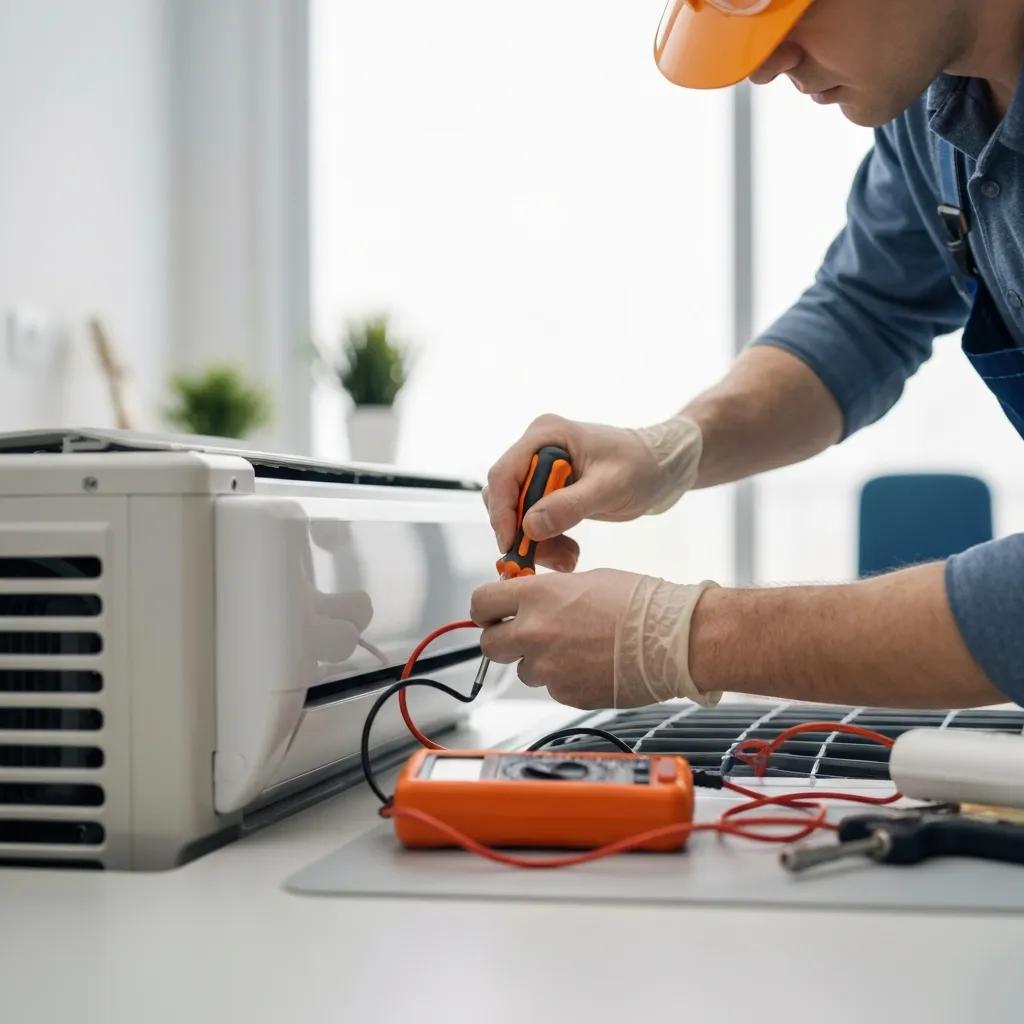Frequently Asked Questions
Why is HVAC maintenance important?
The importance of HVAC maintenance lies in its ability to enhance system efficiency, prolong equipment lifespan, and ensure optimal indoor air quality. Regular maintenance also helps prevent costly repairs and unexpected breakdowns, ultimately promoting a comfortable living environment.
How often HVAC maintenance?
Regular HVAC maintenance is essential, and it is recommended to schedule it at least twice a year—once before the cooling season and once before the heating season—to ensure optimal performance and efficiency.
What does HVAC maintenance include?
HVAC maintenance includes regular inspections, cleaning of components, filter replacements, and system checks to ensure optimal performance, efficiency, and longevity of heating and cooling systems.
What is HVAC maintenance?
HVAC maintenance refers to the regular servicing of heating, ventilation, and air conditioning systems to ensure they operate efficiently and reliably. This includes inspections, cleaning, and repairs to extend the system's lifespan and improve indoor air quality.
What are the benefits of regular HVAC maintenance?
The benefits of regular HVAC maintenance include improved system efficiency, extended equipment lifespan, reduced energy costs, and enhanced indoor air quality. Routine checks also help prevent unexpected breakdowns, ensuring reliable heating and cooling when you need it most.
How can HVAC maintenance improve system efficiency?
Regular HVAC maintenance enhances system efficiency by ensuring optimal performance, reducing energy consumption, and preventing costly breakdowns. This proactive approach helps maintain consistent temperatures and prolongs the lifespan of your heating and cooling systems.
What signs indicate HVAC maintenance is needed?
Signs that indicate HVAC maintenance is needed include unusual noises, inconsistent temperatures, increased energy bills, and poor air quality. If you notice any of these issues, it’s essential to schedule a professional inspection to ensure optimal performance.
How does HVAC maintenance extend system lifespan?
Regular HVAC maintenance extends system lifespan by ensuring optimal performance through routine inspections, cleaning, and necessary repairs, which prevent major breakdowns and improve energy efficiency. This proactive approach helps avoid costly replacements and enhances overall system reliability.
What tasks are performed during HVAC maintenance?
The tasks performed during HVAC maintenance include inspecting and cleaning components, checking refrigerant levels, testing system performance, replacing filters, and ensuring proper airflow to enhance efficiency and extend the lifespan of the system.
How can I schedule HVAC maintenance services?
Scheduling HVAC maintenance services is easy. You can contact Expedition HVAC directly via phone or use our online form to set up an appointment that fits your schedule. Our team is ready to assist you!
What is included in a typical HVAC maintenance plan?
A typical HVAC maintenance plan includes regular inspections, cleaning of components, filter replacements, system checks for efficiency, and priority service for repairs, ensuring optimal performance and longevity of your heating and cooling systems.
How often should I change HVAC filters?
The frequency of changing HVAC filters is crucial for optimal performance. Typically, you should change your HVAC filters every 1 to 3 months, depending on usage and the type of filter. Regular changes help maintain air quality and system efficiency.
What are common HVAC maintenance mistakes to avoid?
Common HVAC maintenance mistakes to avoid include neglecting regular filter changes, skipping professional inspections, and ignoring unusual noises or smells from the system. These oversights can lead to inefficiencies and costly repairs.
How does HVAC maintenance affect energy bills?
Regular HVAC maintenance can significantly lower energy bills by ensuring systems operate efficiently. Well-maintained units consume less energy, reducing overall costs and enhancing comfort in your home.
How can I perform basic HVAC maintenance myself?
Basic HVAC maintenance can be performed by regularly changing air filters, cleaning the condenser and evaporator coils, checking and clearing drain lines, and ensuring proper airflow around the unit. These steps help maintain efficiency and prolong system life.
What is the cost of HVAC maintenance services?
The cost of HVAC maintenance services varies based on factors such as system type and service frequency. Generally, you can expect to pay between $75 to $150 per visit, with annual maintenance plans offering savings and additional benefits.
How does seasonal HVAC maintenance differ?
Seasonal HVAC maintenance differs by focusing on specific tasks tailored to each season. In summer, emphasis is placed on cooling system efficiency, while winter maintenance prioritizes heating system performance, ensuring optimal operation year-round.
What should I expect during an HVAC inspection?
During an HVAC inspection, you can expect a thorough evaluation of your heating and cooling systems, including checks on airflow, refrigerant levels, and overall efficiency. The technician will also identify any potential issues and recommend necessary repairs or maintenance.
How can HVAC maintenance prevent costly repairs?
Regular HVAC maintenance can prevent costly repairs by identifying and addressing potential issues early, ensuring systems operate efficiently, and extending the lifespan of your equipment. This proactive approach reduces the likelihood of unexpected breakdowns and expensive emergency repairs.
What qualifications should HVAC maintenance technicians have?
The qualifications HVAC maintenance technicians should have include a high school diploma or equivalent, completion of an HVAC training program, relevant certifications (such as EPA certification), and hands-on experience in the field.
How does HVAC maintenance improve indoor air quality?
HVAC maintenance improves indoor air quality by ensuring that filters are clean and systems operate efficiently, reducing dust, allergens, and pollutants in the air. Regular servicing also prevents mold growth and maintains optimal humidity levels, promoting a healthier environment.
What is the best time for HVAC maintenance?
The best time for HVAC maintenance is during the spring and fall. Scheduling maintenance during these transitional seasons ensures your system operates efficiently before the peak heating and cooling demands.
How can I find reliable HVAC maintenance providers?
Finding reliable HVAC maintenance providers involves researching local companies, reading customer reviews, checking for proper licensing and insurance, and seeking recommendations from friends or family to ensure quality service and reliability.
What are the consequences of skipping HVAC maintenance?
The consequences of skipping HVAC maintenance include reduced system efficiency, increased energy costs, and a higher likelihood of breakdowns, which can lead to costly repairs and decreased lifespan of your heating and cooling systems.
How does HVAC maintenance impact system warranties?
Regular HVAC maintenance is essential as it helps ensure that your system operates efficiently and can prevent issues that might void your warranty. Many manufacturers require proof of routine maintenance to uphold warranty coverage.
How can I track my HVAC maintenance schedule?
Tracking your HVAC maintenance schedule can be done easily by setting reminders on your calendar, utilizing a maintenance app, or referring to the service agreement provided by your HVAC contractor for scheduled inspections and maintenance dates.
What are the latest trends in HVAC maintenance?
The latest trends in HVAC maintenance include the use of smart technology for remote monitoring, predictive maintenance through data analytics, and a focus on energy efficiency to reduce costs and environmental impact.
How can I educate myself about HVAC maintenance?
Educating yourself about HVAC maintenance involves researching online resources, reading manufacturer manuals, attending workshops, and following reputable HVAC blogs. Additionally, consider enrolling in local courses to gain hands-on experience and knowledge from professionals.





